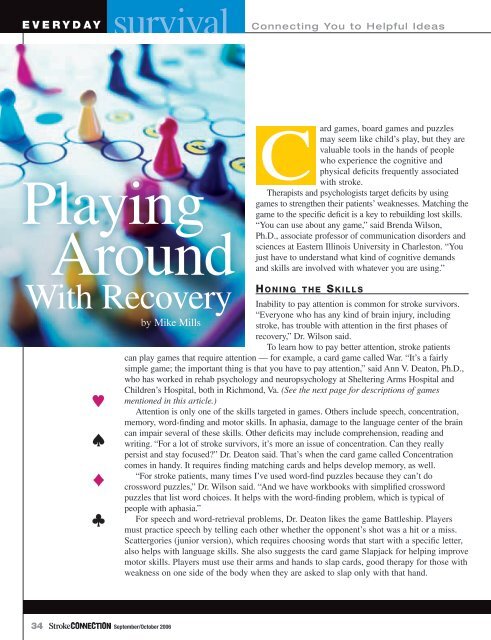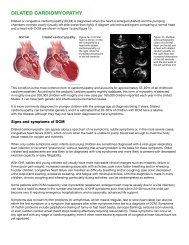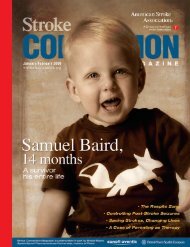Survivor Louise Ingram - American Stroke Association
Survivor Louise Ingram - American Stroke Association
Survivor Louise Ingram - American Stroke Association
Create successful ePaper yourself
Turn your PDF publications into a flip-book with our unique Google optimized e-Paper software.
E V E R Y D A Y Connecting You to Helpful Ideas<br />
Playing<br />
Around<br />
With Recovery<br />
September/October 2006<br />
ard games, board games and puzzles<br />
may seem like child’s play, but they are<br />
valuable tools in the hands of people<br />
who experience the cognitive and<br />
physical deficits frequently associated<br />
with stroke.<br />
Therapists and psychologists target deficits by using<br />
games to strengthen their patients’ weaknesses. Matching the<br />
game to the specific deficit is a key to rebuilding lost skills.<br />
“You can use about any game,” said Brenda Wilson,<br />
Ph.D., associate professor of communication disorders and<br />
sciences at Eastern Illinois University in Charleston. “You<br />
just have to understand what kind of cognitive demands<br />
and skills are involved with whatever you are using.”<br />
H o n i n g t H e S k i l l S<br />
Inability to pay attention is common for stroke survivors.<br />
“Everyone who has any kind of brain injury, including<br />
by Mike Mills<br />
stroke, has trouble with attention in the first phases of<br />
recovery,” Dr. Wilson said.<br />
To learn how to pay better attention, stroke patients<br />
can play games that require attention — for example, a card game called War. “It’s a fairly<br />
simple game; the important thing is that you have to pay attention,” said Ann V. Deaton, Ph.D.,<br />
who has worked in rehab psychology and neuropsychology at Sheltering Arms Hospital and<br />
Children’s Hospital, both in Richmond, Va. (See the next page for descriptions of games<br />
mentioned in this article.)<br />
Attention is only one of the skills targeted in games. Others include speech, concentration,<br />
memory, word-finding and motor skills. In aphasia, damage to the language center of the brain<br />
can impair several of these skills. Other deficits may include comprehension, reading and<br />
writing. “For a lot of stroke survivors, it’s more an issue of concentration. Can they really<br />
persist and stay focused?” Dr. Deaton said. That’s when the card game called Concentration<br />
comes in handy. It requires finding matching cards and helps develop memory, as well.<br />
“For stroke patients, many times I’ve used word-find puzzles because they can’t do<br />
crossword puzzles,” Dr. Wilson said. “And we have workbooks with simplified crossword<br />
puzzles that list word choices. It helps with the word-finding problem, which is typical of<br />
people with aphasia.”<br />
For speech and word-retrieval problems, Dr. Deaton likes the game Battleship. Players<br />
must practice speech by telling each other whether the opponent’s shot was a hit or a miss.<br />
Scattergories (junior version), which requires choosing words that start with a specific letter,<br />
also helps with language skills. She also suggests the card game Slapjack for helping improve<br />
motor skills. Players must use their arms and hands to slap cards, good therapy for those with<br />
weakness on one side of the body when they are asked to slap only with that hand.







